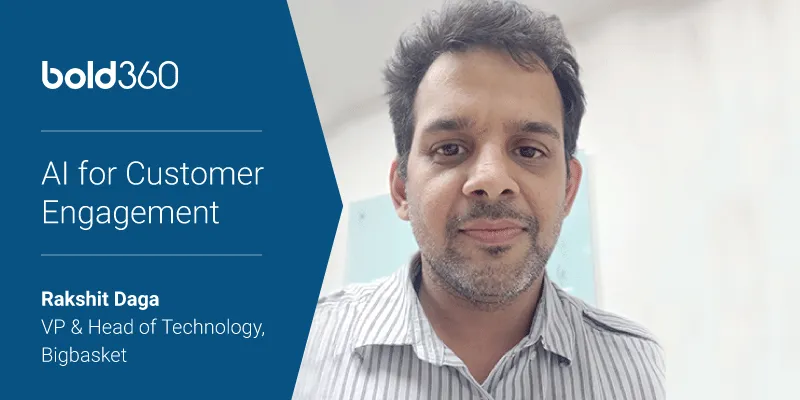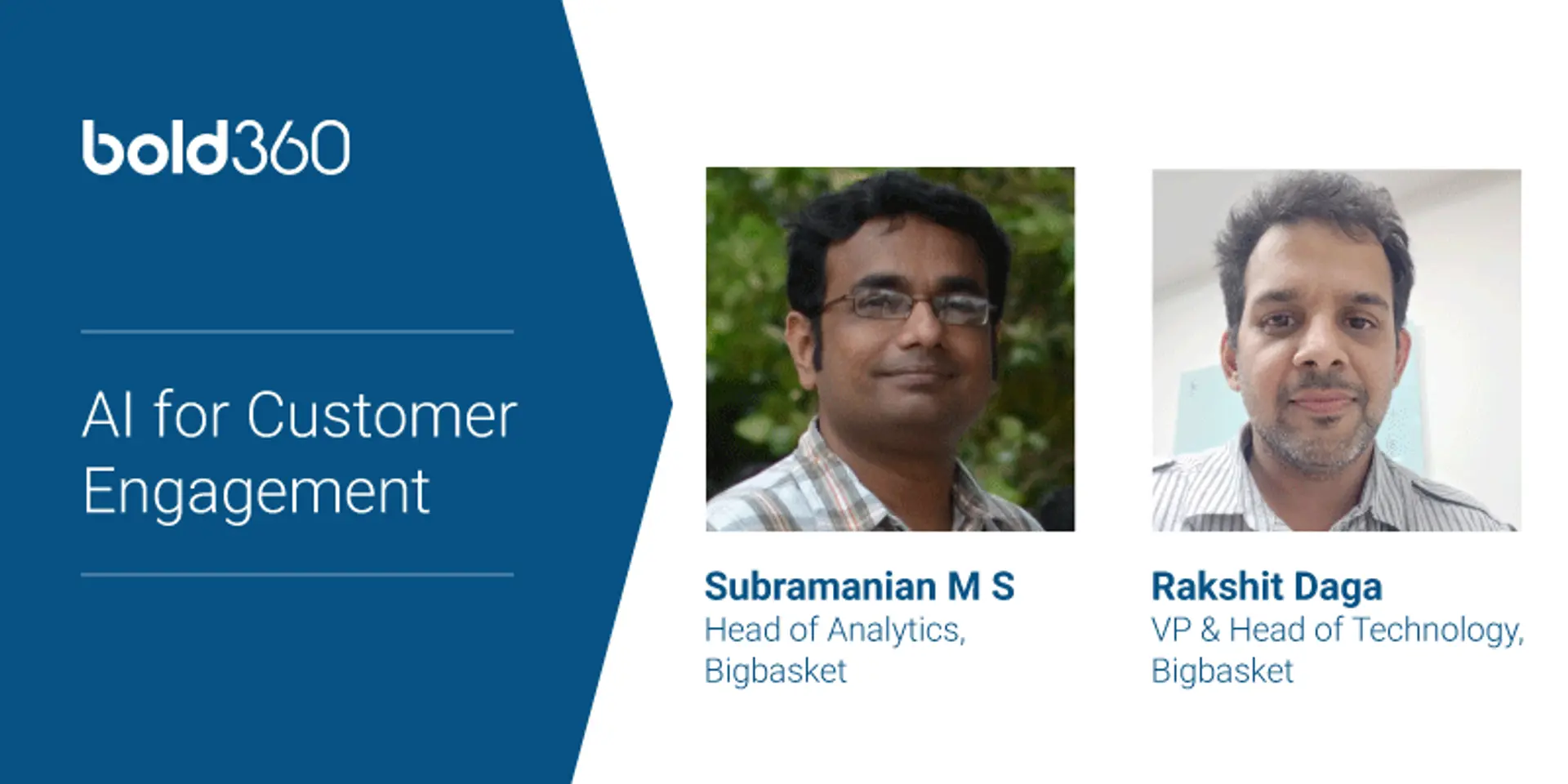
Bold360
View Brand PublisherBigbasket’s tech leaders share why AI is a pivotal part of their solution toolkit to enhance customer experience
Men wearing bright green t-shirts unloading crates of fresh vegetables, fruits, groceries and household essentials from a mini-truck – this description is enough to tell you that we are referring to bigbasket – one of India’s largest online food and grocery companies.
The startup is credited with bringing to life what was thought to be an impossible feat in India – selling groceries and fast moving consumer goods online. Today, nearly seven years after bigbasket began its journey in December 2011, it is known for its quality, variety, competitive pricing, timeliness, and well-trained staff.
This journey has been driven by a healthy combination of leadership, strategy and technology, always keeping the customer at the core.
Customer experience at the core of AI
“Being a customer-centric online marketplace, everything that we do ultimately impacts the customer experience, directly or indirectly,” says Rakshit Daga, VP and Head of Technology at bigbasket. bigbasket began its AI journey in 2015. “Not because we thought AI was cool to have but because of the differentiated advantages that it could bring. We realised that AI solutions can scale and deliver value rapidly. Today, AI has become a pivotal part of our solution toolkit that we use to enhance customer experience, ” affirms Subramanian M S (Mani), Head of Analytics, bigbasket.
Mani rationalises that the AI spectrum is very broad, with Machine Learning at one end, where the focus is on enabling machines to operate independently and goes on to Deep Learning, where the focus is on training the machine to perform human-like tasks, such as recognising speech, identifying images or making predictions. “Given this context, our AI journey so far has focused primarily on ML. We are now at a stage where we are going deeper into AI and exploring related technologies such as IoT, Computer Vision and Advanced Analytics, to grow the business,” he adds.
Getting the delivery game on point even while its fleet and orders growing 3x
Among the first use-cases of AI at BigBasket has been route optimisation. Today, their AI algorithm analyses current traffic data and tallies it against the committed delivery slot, ensuring that the delivery happens within the said time frame while keeping costs to the bare minimum.

Prior to the implementation of AI, bigbasket leveraged Operations Research (OR) techniques for route optimisation. “The OR techniques required manual intervention to further rationalise system generated routes. This meant it was not only time consuming but also effort intensive, and prone to errors. Additionally, lack of real-time traffic information and predictive capabilities added to the complexity of making on-time delivery,” says Rakshit. When bigbasket began keenly looking at AI / ML to address these pain points, they had anywhere between 1,500-2,500 delivery vehicles plying on 3,000-5000 routes across nine cities in India. The fleet spent about 18 hours on the roads.
By leveraging the best-in-class AI/ML algorithms in combination with real-time traffic and delivery-related data, bigbasket has been able to maintain superlative efficiency even with their fleet size and routes expanding nearly three times in three years. The ML engine accurately maps end customer locations which helps build dynamic route clusters depending on the load, thus eliminating the need for manual intelligence and decision-making. Additionally, the system leaves room for flexibility in planning for multi nodal and multi-hub drop-offs, forward and reverse pick-ups and scheduled and on-demand deliveries. The ML-based vehicle allocation engine also recommends the number and types of vehicle needed, thereby enabling maximum vehicle utilisation.
“The overall impact ML has brought to route optimisation includes reduction in delivery transit which translates into reduced fuel consumption, optimised vehicle utilisation and dynamic route clusters, leading to better operations efficiency, transparency and optimised cost,” says Rakshit.
The team now plans to leverage predictive capabilities further to foresee potential issues due to weather and traffic conditions and use those predictions to optimise routes even more proactively.
The twin advantage with AI: Better customer value, better business growth
bigbasket leverages AI for a variety of use-cases, all of which tie back to enhanced customer experience – from product recommendations to developing pricing strategy. For instance, using ML techniques such as affinity analysis, fp-growth analysis and collaborative filtering, bigbasket not only suggests items that are a regular in the customer’s basket but also recommends products related to items already in the customer’s cart. So if a user has included pasta in the basket, recommended products include pasta sauces and vegetables such as broccoli, etc.
Natural Language Processing and other ML techniques have helped BigBasket create an advantage in another key area – pricing. “We have observed a 40 percent improvement in price perception amongst our customers and a significant growth in sales since we started using AI for pricing,” says Rakshit.
“When you are able to offer customers a better price than the market, it translates into savings for them, thereby delivering better value to the customer. Doing so can help you gain trust and stickiness,” explains the CTO. AI is also helping the brand expand its product catalogue which already boasts of 18,000 products and over 1,000 brands. “Our AI algorithms helped identify products that were bought together or in multiple quantities. This helped our merchandising teams create combo-packs and multi-packs as additions to our product catalogue.”
Another key business area where AI is already playing a big role is fraud detection. Their AI engines have been designed to apply a fraud score on the fly and highlight the likelihood of a fraud even before the order is confirmed. Once a transaction is flagged as fraudulent, the customer support staff immediately reaches out to the customer over a call and investigates the authenticity, and the order is processed only if it is genuine. This way bigbasket has been able to unmask B2B customers masquerading as B2C customers and limit fraud.
Helping the internal workforce deliver on the brand’s promise
Helping bigbasket execute over 2 million orders a month across 24 cities in India is a 16,000 strong workforce, which includes a customer support team of 1,000 employees. As one of the few B2C companies that decided not to have an IVR and a goal to ensure that every customer support call gets connected within 10 seconds, bigbasket has been working towards leveraging AI and chatbots to up its customer service quotient. The startup has already integrated AI into its knowledge management system to enable customer support executives to access FAQs and various processes in the customer support function while they are on a live call. Just by keying in one or two contextual words, the executives can pull out process documents that help resolve queries without having to escalate the call to a lead. The startup is also working on leveraging AI to guide customer support executives during a live customer support call by suggesting best possible actions or solutions for the query by looking at the customer’s history in split seconds. As the startup continues to scale, it is also looking at the possibility of getting at least 80 percent call recordings audited through AI.
bigbasket is also working on achieving better workforce management with AI. This includes analysing past history and trends to predict the likelihood of absenteeism and be better prepared and responsive.
Analysis to deployment; virtual to real.
Helping bigbasket on its AI journey is a team of 20 Analysts, Data Scientists and ML engineers working on solutions using a combination of diagnostic, operations research, heuristics and ML/AI techniques. The team works in close collaboration with the product and engineering teams within the organisation and external partners. Some of the key focus areas that this team is working on include engaging its product recommendation and personalisation engine, using vision recognition solutions to improve productivity, log anomaly detection, and inventory forecasting, among a host of others.

Helping the Analytics and AI team at bigbasket bring these projects to life are some external partners. Mani says, “We work with partners who bring with them niche expertise that allows us to go-to market rapidly. In the case of solutions where we leverage expertise of partners, the in-house teams conceptualise and design the solutions, work with partners to develop and integrate the solution and then take ownership of the deployment of the solution in production.”
Towards solving newer business problems and enhancing current solutions
Like any key technology integration, AI brings its set of challenges. For bigbasket, challenges have included identifying a suitable AI model, scaling it for production and integrating it. “We try to over arch these challenges by developing a prototype model as a POC, using standard engineering integration frameworks (kubernetes-based microservices model) and the likes. Challenges and opportunities are part of any AI journey. It is a work in progress,” says Mani.
As the startup continues to be bullish on its growth, “AI will continue to be a key focus areas to solve newer business problems even as we continue to enhance some of the current solutions and offerings by incorporating AI models, all of which keeps customer experience at its core,” sums up Rakshit.
This article is part of the thought leadership articles in collaboration with LogMeIn. The series features prominent founders or C-Suite leaders from renowned firms talking about how they are working with AI to successfully transform their business. Take a look at some of the other articles from the series.







